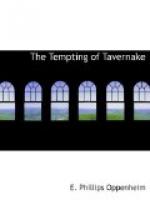Her father leaned towards her.
“Elizabeth,” he said, “I never really understood. What was it that came over him so suddenly? One day he was your slave, the next I think he would have murdered you if he could.”
She shrugged her shoulders.
“Honestly,” she replied, “I felt it impossible to keep up the sham any longer. I married Wenham Gardner in New York because he was supposed to be a millionaire and because it seemed to be the best thing to do, but as to living with him, I never meant that. You know how ridiculous his behavior was on the boat. He never let me out of his sight, but swore that he was going to give up smoking and drinking and lead a new life for my sake. I really believe he meant it, too.”
“Wouldn’t it have been better, dear,” her father suggested, timidly, “to have encouraged him?”
She shook her head.
“He was absolutely hopeless,” she declared. “You say that I have no nerves; that is because I do not allow myself to suffer. If I had gone on living with Wenham, it would have driven me mad. His habits, his manner of life, everything disgusted me. Until I came to see so much of him, I never understood what the term ‘decadent’ really can mean. The very touch of him grew to be hateful. No woman could live with such a man. By the way, he signed the draft, I suppose?”
Her father handed her a slip of paper, which she looked at and locked in her drawer.
“Did he make any trouble about it?” she asked.
The professor shivered.
“He refused to sign it,” he said, in a low tone, “swore he would never sign it. Mathers sent me out for a few minutes, made me go into another room. When I came back, he gave me the draft. I heard him calling out.”
“Mathers certainly earns his money,” she remarked, drily.
He gazed at her with grudging admiration. This was his daughter, his own flesh and blood. Back through the years, for a moment, he seemed to see her, a child with hair down her back, sitting on his knee, listening to his stories, wondering at the little arts and tricks by which he had wrested their pennies and sixpennies from a credulous public. Phrenologist, hypnotist, conjurer—all these things the great Professor Franklin had called himself. Often, from the rude stage where he had given his performance, he had terrified to death the women and children of his audience. It flashed upon him at that moment that never, even in the days of her childhood, had he seen fear in Elizabeth’s face.
“You should have been a man, Elizabeth,” he muttered.
She shook her head, smiling as though not ill-pleased at the compliment.
“The power of a man is so limited,” she declared. “A woman has more weapons.”
“More weapons indeed,” the professor agreed, as his eyes traveled over the slim yet wonderful perfection of her form, lingered for a moment at the little knot of lace at her throat, wrestled with the delicate sweetness of her features, struggling hard to think from whom among his ancestors could have come a creature so physically attractive.




